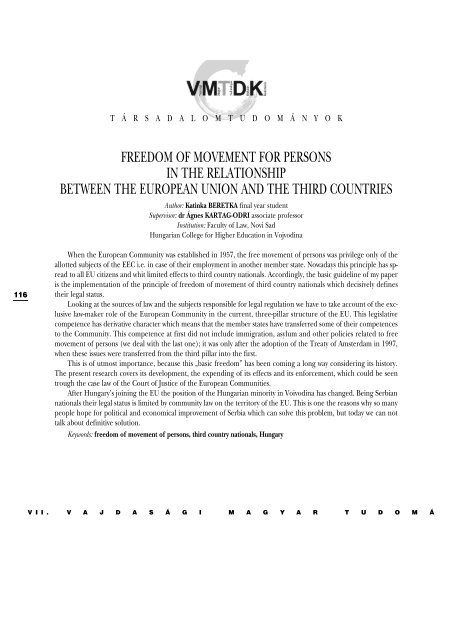Rezümékötet 2008. - vmtdk
Rezümékötet 2008. - vmtdk
Rezümékötet 2008. - vmtdk
You also want an ePaper? Increase the reach of your titles
YUMPU automatically turns print PDFs into web optimized ePapers that Google loves.
116<br />
T Á R S A D A L O M T U D O M Á N Y O K<br />
FREEDOM OF MOVEMENT FOR PERSONS<br />
IN THE RELATIONSHIP<br />
BETWEEN THE EUROPEAN UNION AND THE THIRD COUNTRIES<br />
Author: Katinka BERETKA final year student<br />
Supervisor: dr Ágnes KARTAG-ODRI associate professor<br />
Institution: Faculty of Law, Novi Sad<br />
Hungarian College for Higher Education in Vojvodina<br />
When the European Community was established in 1957, the free movement of persons was privilege only of the<br />
allotted subjects of the EEC i.e. in case of their employment in another member state. Nowadays this principle has spread<br />
to all EU citizens and whit limited effects to third country nationals. Accordingly, the basic guideline of my paper<br />
is the implementation of the principle of freedom of movement of third country nationals which decisively defines<br />
their legal status.<br />
Looking at the sources of law and the subjects responsible for legal regulation we have to take account of the exclusive<br />
law-maker role of the European Community in the current, three-pillar structure of the EU. This legislative<br />
competence has derivative character which means that the member states have transferred some of their competences<br />
to the Community. This competence at first did not include immigration, asylum and other policies related to free<br />
movement of persons (we deal with the last one); it was only after the adoption of the Treaty of Amsterdam in 1997,<br />
when these issues were transferred from the third pillar into the first.<br />
This is of utmost importance, because this „basic freedom” has been coming a long way considering its history.<br />
The present research covers its development, the expending of its effects and its enforcement, which could be seen<br />
trough the case law of the Court of Justice of the European Communities.<br />
After Hungary’s joining the EU the position of the Hungarian minority in Voivodina has changed. Being Serbian<br />
nationals their legal status is limited by community law on the territory of the EU. This is one the reasons why so many<br />
people hope for political and economical improvement of Serbia which can solve this problem, but today we can not<br />
talk about definitive solution.<br />
Keywords: freedom of movement of persons, third country nationals, Hungary<br />
V I I . V A J D A S Á G I M A G Y A R T U D O M Á




